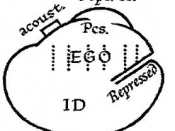Introduction
Individuals are not just aware of their place in the world, they are also involved in group interactions, all of which are located within social settings, each of these dimensions --- subjectivity, intersubjectivity and social context --- must be taken into account (Pile, 1996: 53). According to Judith Butler, the truth of sex is "produced and compelled by the regulatory practices of gender coherence" (1990: 24). Gender norms are under legitimate regulations. It is "the repeated stylization of the body, a set of repeated acts within a highly rigid frame that congeal over time to produce the appearance of substance, of natural sort of being" (Butler, 1990: 33). Subjectivity becomes a performance, a masquerade. Essence is absent under self discipline. People assume themselves to be the kind of people they are, and react to others on the basis of the types of people they seem to be.
In Yukio Mishima's Confessions of a Mask, the I-narrator describes his childhood and adolescent experiences in an attempt to isolate early signs of his homosexuality, seemingly to aid his rhetoric of confession.
His account of sadomasochistic homosexual desires tangles between fact and fiction, without a clear distinction between notions of masking and unmasking. Is the narrator's sexuality a performance? How do ideas of abjection, fetishism, and death drive interact with each other? Does the narrator try to repress his sexual drive under what Butler calls "regulatory practices"? This essay serves to examine the above and the question of whether or not this novel is entirely confessional shall be discussed as well.
The Id, Ego, and Super-ego topology
According to Freud, personality rests on the dynamic interaction of three mental elements: the id --- the storehouse of subconscious sexual or aggressive impulses; the super-ego --- the conscience; and the ego --- the...


